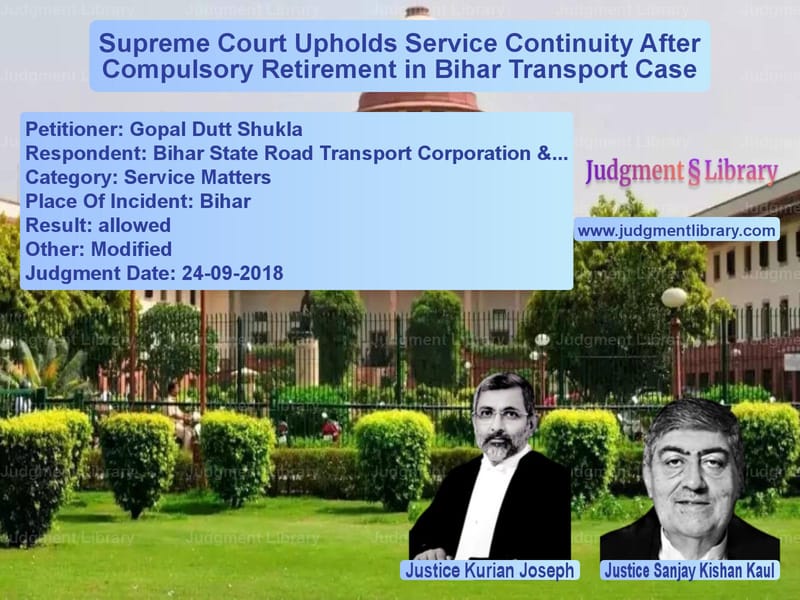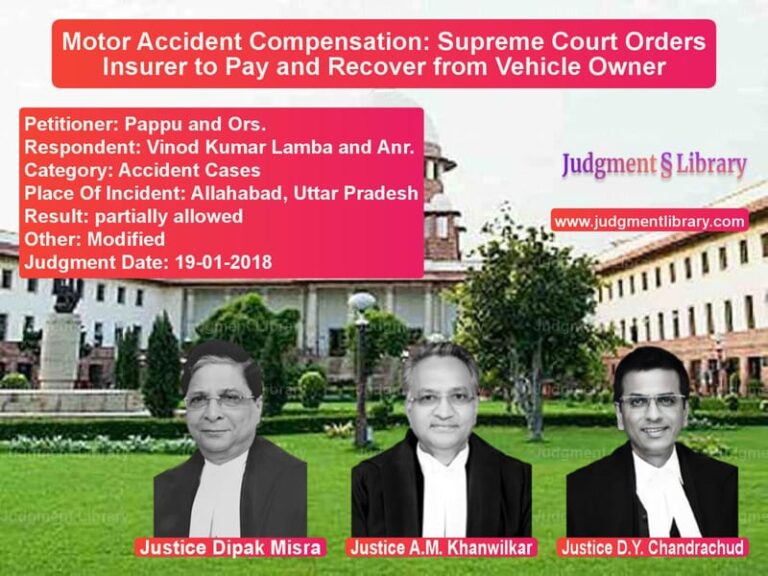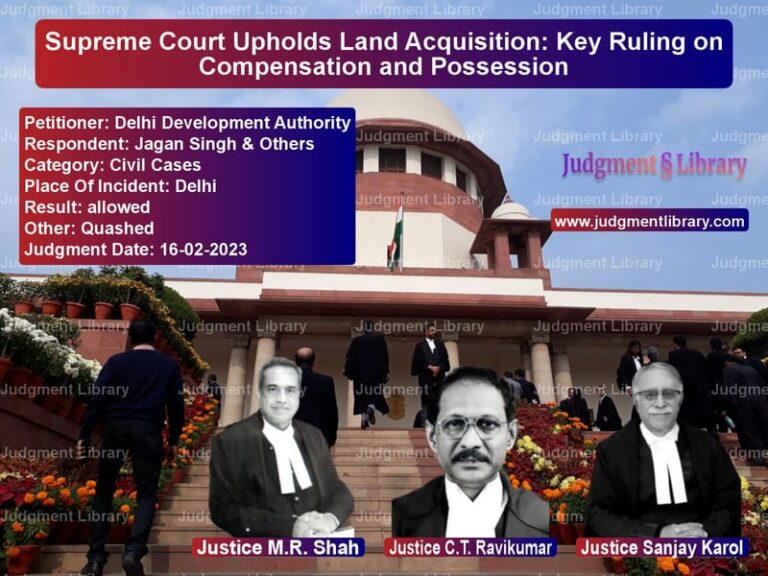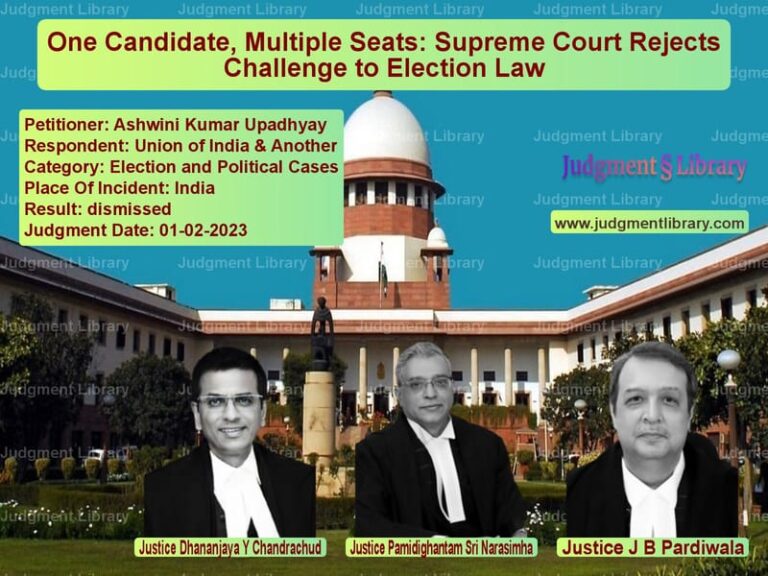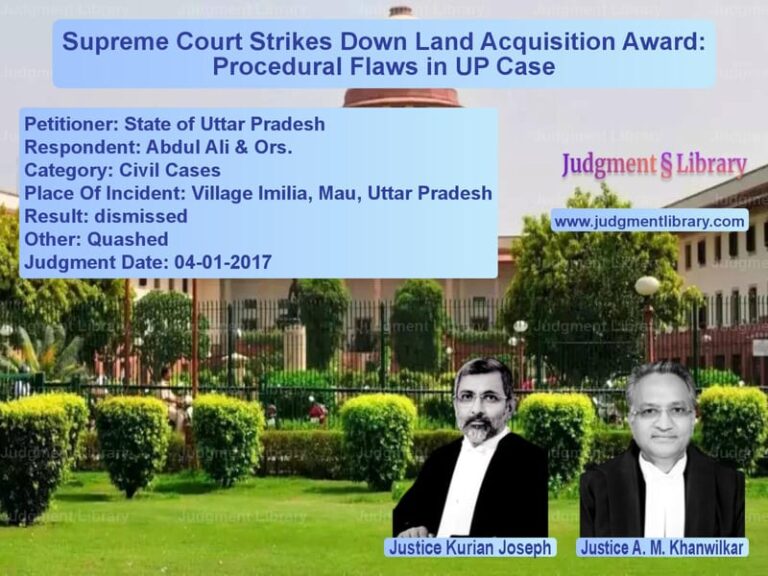Supreme Court Upholds Service Continuity After Compulsory Retirement in Bihar Transport Case
The case of Gopal Dutt Shukla v. Bihar State Road Transport Corporation & Ors. is a significant ruling concerning employee rights after wrongful compulsory retirement. The Supreme Court had to decide whether the appellant was entitled to full service benefits, including back wages, for the period between his retirement and reinstatement. This case highlights the legal principles governing wrongful termination, reinstatement, and entitlement to salary during the period of forced unemployment.
Background of the Case
The appellant, Gopal Dutt Shukla, was an employee of the Bihar State Road Transport Corporation (BSRTC). On 08.10.2004, he was compulsorily retired from service due to disciplinary proceedings initiated against him. The reasons cited for his retirement were not fully disclosed in the Supreme Court’s judgment, but it was clear that he contested the decision, believing it to be unlawful.
After a prolonged legal battle, the order of compulsory retirement was set aside on 28.11.2007, and he was reinstated in service. However, the BSRTC refused to grant him service benefits, including back wages, for the period between 08.10.2004 and 28.11.2007. The appellant, aggrieved by the denial of his full entitlements, approached the courts seeking justice.
Legal Issues Considered
- Was the appellant entitled to full service benefits, including back wages, for the period between his compulsory retirement and reinstatement?
- Should the period of compulsory retirement be treated as continuous service?
- Did BSRTC act unfairly in denying back wages despite the appellant’s successful challenge to his retirement?
- What are the legal precedents governing reinstatement after wrongful compulsory retirement?
Arguments by the Appellant
Gopal Dutt Shukla contended that:
- The order of compulsory retirement was unjustified and was set aside by a competent authority.
- He was willing and able to work during the intervening period, but the wrongful action of the BSRTC prevented him from doing so.
- Since he was reinstated, he should be entitled to all consequential benefits, including full salary and promotions.
- The refusal to pay him back wages was against the principles of natural justice.
- Several Supreme Court precedents have established that employees wrongfully removed from service are entitled to full back wages upon reinstatement.
Arguments by the Respondents
The Bihar State Road Transport Corporation countered with the following arguments:
- While the appellant’s compulsory retirement was set aside, he had not actually worked during the period between 08.10.2004 and 28.11.2007.
- Compensating him with full back wages for this period would be unfair to the corporation, as no work was performed.
- The financial burden on the corporation must be considered while awarding back wages.
- The appellant was given full reinstatement, and treating the period as continuous service was a reasonable settlement.
Supreme Court’s Observations
The Supreme Court analyzed the matter and ruled that while the appellant’s service should be treated as continuous, he would not be entitled to back wages. The Court stated:
“The original order of compulsory retirement imposed on the appellant on 08.10.2004 having been set aside on 28.11.2007, the appellant would normally have been entitled to all the consequential benefits. But the fact remains that he has not actually worked from the date of punishment imposed on him i.e. from 08.10.2004 till reinstatement pursuant to the order dated 28.11.2007.”
The Court emphasized that the principle of “no work, no pay” applies unless the removal of an employee is proven to be mala fide (done in bad faith) or with an ulterior motive. Since no such finding was recorded in this case, full back wages were not granted.
Key Precedents Considered
The Supreme Court referred to previous rulings to support its decision:
- Union of India v. K.V. Jankiraman (1991) 4 SCC 109: This case held that reinstatement does not automatically entitle an employee to back wages unless the termination was found to be wrongful.
- State Bank of India v. J.K. Agrawal (1993) 1 SCC 114: The Court ruled that an employee reinstated after wrongful termination is entitled to back wages only if it is found that the employer acted in bad faith.
- Man Singh v. State of Haryana (2008) 12 SCC 331: Held that service benefits should be granted upon reinstatement, but back wages are discretionary and depend on the facts of each case.
Supreme Court’s Final Judgment
The Supreme Court delivered a balanced judgment, considering both the appellant’s rights and the financial burden on BSRTC. The Court ruled:
- The appellant’s service between 08.10.2004 and 28.11.2007 should be treated as continuous for all purposes, including pension and seniority.
- However, the appellant will not receive back wages for the period he did not work.
- The appeal was disposed of with this modification.
The Court concluded:
“In view of the above, the respondents are directed to treat the service of the appellant between the date of compulsory retirement and the date of reinstatement pursuant to the order dated 28.11.2007 as continuous for all purposes, except for the actual wages.”
Implications of the Judgment
The Supreme Court’s decision provides clear guidance on handling reinstatement cases after wrongful compulsory retirement:
- Employees who successfully challenge wrongful retirement are entitled to continuity of service benefits.
- Back wages are not automatically granted and depend on whether the employer’s action was malicious.
- Organizations must ensure that disciplinary actions leading to compulsory retirement are well-founded to avoid unnecessary litigation.
- Courts will balance employee rights against the financial burden on public sector entities.
Conclusion
This case highlights the delicate balance between employee rights and employer responsibilities. While wrongful compulsory retirement should not deprive an employee of service continuity, the Court upheld the “no work, no pay” principle to avoid undue financial strain on the employer. The ruling reinforces that reinstatement does not automatically mean back wages, making it a significant precedent in employment law.
Petitioner Name: Gopal Dutt Shukla.Respondent Name: Bihar State Road Transport Corporation & Ors..Judgment By: Justice Kurian Joseph, Justice Sanjay Kishan Kaul.Place Of Incident: Bihar.Judgment Date: 24-09-2018.
Don’t miss out on the full details! Download the complete judgment in PDF format below and gain valuable insights instantly!
Download Judgment: Gopal Dutt Shukla vs Bihar State Road Tra Supreme Court of India Judgment Dated 24-09-2018.pdf
Direct Downlaod Judgment: Direct downlaod this Judgment
See all petitions in Public Sector Employees
See all petitions in Termination Cases
See all petitions in Pension and Gratuity
See all petitions in Judgment by Kurian Joseph
See all petitions in Judgment by Sanjay Kishan Kaul
See all petitions in allowed
See all petitions in Modified
See all petitions in supreme court of India judgments September 2018
See all petitions in 2018 judgments
See all posts in Service Matters Category
See all allowed petitions in Service Matters Category
See all Dismissed petitions in Service Matters Category
See all partially allowed petitions in Service Matters Category

